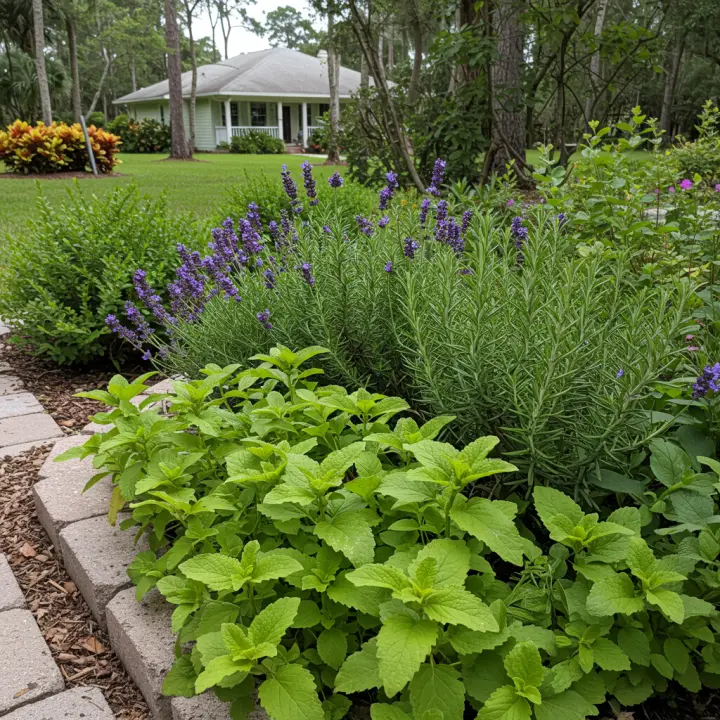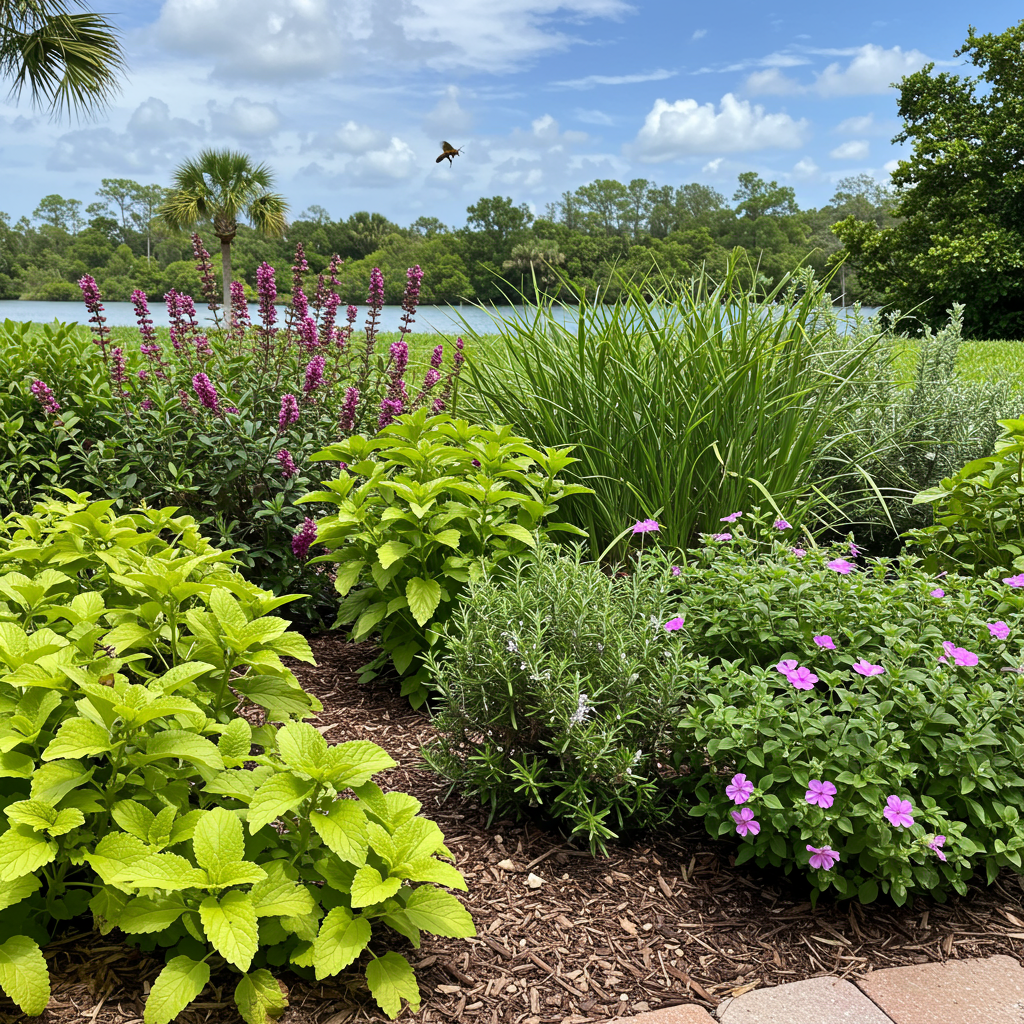Discover how to transform your outdoor space into a sanctuary free from bothersome bugs. This guide highlights the best insect repellent plants for Florida gardens, offering natural, effective solutions to keep mosquitoes, ants, and other pests at bay. Learn about top plant choices, strategic garden design, and care tips to cultivate a beautiful, pest-resistant Florida paradise.

Banish Bugs Naturally: Crafting Your Ultimate Florida Garden with Repellent Plants
Florida’s lush landscapes are beautiful, but the warm, humid climate also makes it a prime habitat for a host of unwelcome insects. From buzzing mosquitoes to crawling ants, these pests can quickly turn a relaxing evening outdoors into an itchy ordeal. While chemical sprays offer a quick fix, many gardeners are seeking eco-friendly, sustainable ways to protect their outdoor havens. Enter the world of insect repellent plants – nature’s own pest control army!
This guide will help you select and cultivate the most effective insect repellent plants for Florida, enabling you to enjoy your garden’s beauty without constant harassment from bugs. Imagine a fragrant, vibrant garden that naturally deters pests, creating a comfortable and inviting space for family and friends.
Why Choose Natural Insect Repellents for Your Florida Garden?
Opting for plants over pesticides offers a multitude of benefits, not just for your garden, but for your health and the environment.
The Benefits of a Chemical-Free Approach
Healthier Environment: Reduce exposure to synthetic chemicals for your family, pets, and beneficial wildlife.
Eco-Friendly: Support local ecosystems, pollinators, and biodiversity by minimizing harmful runoff.
Sustainable & Cost-Effective: Once established, these plants provide continuous pest deterrence with minimal ongoing cost.
Aesthetic Appeal: Many repellent plants are also beautiful, fragrant, and can enhance your garden’s visual appeal.
Dual Purpose: Many are also culinary herbs, adding fresh flavors to your kitchen!
How Repellent Plants Work (Natural Compounds)
The magic behind these plants lies in their natural oils and compounds. These volatile chemicals, released from the plant’s leaves, stems, or flowers, often have a strong scent that insects find unpleasant or disorienting. For mosquitoes, these scents can mask the carbon dioxide and lactic acid that attract them to humans. For other pests, the compounds might act as deterrents, irritants, or even neurotoxins, convincing them to seek greener pastures elsewhere.
Top Insect Repellent Plants Thriving in Florida
Florida’s unique subtropical climate means not all repellent plants will thrive here. We’ve selected the best options that love the Sunshine State’s warmth and humidity.
Mosquito Masters: Plants That Banish Bites
These plants are your first line of defense against Florida’s most notorious pest.
Citronella Grass (Cymbopogon nardus): The undisputed champion of mosquito repellency. While the plant itself looks like tall grass, its oil is what’s used in popular repellents. Plant it strategically around seating areas.
Lemongrass (Cymbopogon citratus): Similar to citronella, lemongrass also contains citronellal, making it highly effective against mosquitoes. Plus, it’s a fantastic culinary herb!
Catnip (Nepeta cataria): Surprisingly, catnip has been found to be even more effective than DEET at repelling mosquitoes. Be warned: your feline friends will love it!
Marigolds (Tagetes spp.): The strong, distinctive scent of marigolds (especially French marigolds) deters mosquitoes, nematodes, and other unwelcome garden visitors.
Basil (Ocimum basilicum): Beyond its culinary uses, basil, especially varieties like Lemon Basil or Cinnamon Basil, emits a strong aroma that mosquitoes dislike.
Rosemary (Rosmarinus officinalis): This fragrant herb is excellent at repelling mosquitoes and also whiteflies, cabbage moths, and slugs. It thrives in Florida’s sun.
Scented Geraniums (Pelargonium citrosum ‘Citrosa’): Often marketed as “Mosquito Plant,” these beautiful plants have a lemony scent that helps deter mosquitoes.
Beyond Mosquitoes: Repelling Other Pests
Don’t stop at mosquitoes; these plants can help manage a broader range of garden invaders.
Mint (Mentha spp.): A highly aromatic plant that deters ants, fleas, mosquitoes, and even mice. Be careful, as mint can be aggressive; consider planting it in containers.
Garlic (Allium sativum): While not typically planted for its repellent foliage, garlic’s strong scent can deter aphids, slugs, snails, and various other garden pests. Plant it among susceptible plants.
Chrysanthemums (Chrysanthemum spp.): Certain varieties contain pyrethrum, a natural insecticide. While you won’t extract it yourself, their presence can deter roaches, ticks, fleas, and various flying insects.
Lavender (Lavandula spp.): Beautiful and fragrant, lavender repels moths, fleas, flies, and mosquitoes. Its calming aroma is a bonus for humans!
Oregano (Origanum vulgare): Like other herbs in its family, oregano’s strong scent deters many common garden pests.
Designing Your Ultimate Insect Repellent Florida Garden
Strategic placement and thoughtful design are key to maximizing the effectiveness of your repellent plants.
Strategic Placement for Maximum Protection
Border Your Seating Areas: Plant repellent species like Citronella, Lemongrass, and Rosemary around patios, decks, and outdoor dining spaces.
Near Entryways: Place potted repellent plants near doors and windows to discourage insects from entering your home.
Along Paths: Line pathways with fragrant herbs that release their repellent oils when brushed against.
Around Water Features: Mosquitos love standing water. Strategically place repellent plants near bird baths or ponds to reduce their attractiveness.
Companion Planting Techniques
Integrate repellent plants among your vegetables, flowers, and fruit trees. For example:
Plant Marigolds around tomatoes to deter nematodes.
Place Basil near peppers or beans to repel flies and mosquitoes.
Incorporate Rosemary near broccoli, cabbage, or carrots to ward off moths.
Container Gardening for Flexibility
Many repellent plants, especially mint and catnip, can be aggressive spreaders. Planting them in pots allows you to control their growth and move them easily to wherever protection is needed most. This is particularly useful for container gardens on balconies or small patios.
Caring for Your Repellent Powerhouses in Florida’s Climate
Even the toughest plants need a little love to thrive and remain effective pest deterrents.
Watering and Sunlight Needs
Most of these repellent plants (especially herbs) prefer full sun (6+ hours daily) and well-draining soil. Overwatering is a common mistake in Florida; always check soil moisture before watering again. Some, like mint, can tolerate partial shade, but their oil production might be reduced.
Soil and Fertilization
Good drainage is paramount in Florida. Amend heavy clay soils with organic matter like compost. Most herbs don’t require heavy fertilization; a balanced, slow-release organic fertilizer once or twice a year is usually sufficient. Over-fertilizing can lead to lush growth but weaker oil production.
Pruning for Potency
Regular pruning encourages bushier growth and enhances the production of essential oils. When pruning, snip off flower heads before they go to seed to encourage the plant to put its energy into leaf production (where the repellent oils are often concentrated). Use the clippings in sachets or rub them on your skin for an extra layer of temporary natural protection.
Frequently Asked Questions (FAQs)
Q1: Do insect repellent plants really work as well as chemical sprays?
A1: While plants offer natural deterrence, they may not offer the same concentrated, wide-area protection as chemical sprays. Their effectiveness is best when used in clusters, around gathering areas, and by brushing against them to release their oils. They are most effective as a preventative measure and part of a multi-pronged approach to pest management.
Q2: Can I rub these plants directly on my skin for protection?
A2: Yes, you can gently crush the leaves of plants like Citronella, Lemongrass, Rosemary, or Basil and rub them on your exposed skin for temporary relief. However, always do a patch test first to ensure you don’t have an allergic reaction.
Q3: Which insect repellent plants are native to Florida?
A3: While many popular repellent plants like Citronella and Lemongrass are not native, some native or naturalized options include certain types of Horsemint (Monarda punctata), which also have repellent qualities and support native pollinators. Rosemary is not native, but thrives here.
Q4: How much space do I need for an insect repellent garden?
A4: You can create an effective insect repellent garden in any size space! Even a few strategically placed pots on a patio can make a significant difference. For larger areas, integrate these plants into your existing landscape.
Q5: Are these plants safe for pets?
A5: Most of the listed culinary herbs (Basil, Rosemary, Mint, Lemongrass) are generally safe for pets in moderation. However, Catnip can be stimulating for cats, and ingestion of large amounts of some plants (e.g., Marigolds, Geraniums) can cause mild stomach upset in some animals. Always research specific plant toxicity if you have pets who might munch on your garden.
Conclusion
Creating an ultimate Florida garden with insect repellent plants** is a rewarding endeavor that offers a natural, sustainable, and beautiful solution to common pest problems. By strategically planting species like Citronella, Lemongrass, Rosemary, and Basil, you can significantly reduce the presence of mosquitoes and other bothersome insects. Embrace nature’s pest control, design your garden with purpose, and follow good care practices to cultivate a vibrant, fragrant, and bug-free outdoor sanctuary for years to come. Enjoy your Florida paradise, protected by the power of plants!

